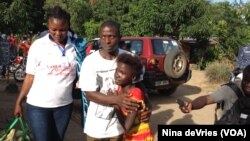The U.N. Children’s Fund reports thousands of Ebola orphans in West Africa face stigma and rejection from their families and communities for fear of being infected. As a consequence, UNICEF said many of these orphans are abandoned and must fend for themselves.
The U.N. Children’s Fund said at least 3,700 children in Guinea, Liberia and Sierra Leone have lost one or both parents to Ebola since the outbreak began late in 2013.
UNICEF Regional Director for West and Central Africa, Manuel Fontaine, said this number is probably just the tip of the iceberg and the number of children orphaned by Ebola is likely to double by mid-October.
The UNICEF official has just returned from a two-week visit to the three Ebola affected countries.
Speaking on a line from Dakar, Senegal, he said children usually go to Ebola treatment centers with parents who have become ill. If their parents die, he says the children are left alone. He added that finding someone to care for them is a problem.
“The issue still remains very much stigma…For example, we have had a case recently of a young four-year-old boy who was in this situation. We had found a survivor to take care of the child and it was the community that basically rejected the child," he stated. "So, it is extremely difficult…Increasing number of children are left on their own in their homes because there was an Ebola case. They are usually being fed by neighbors, but no more than that and not cared for.”
Fontaine said UNICEF is looking for alternative ways of getting care for these orphaned children. One is to have Ebola survivors take care of these children-at least during the 21-day incubation period. After that, he says other long-term solutions will have to be found.
He told VOA the Ministry of Social Welfare in Sierra Leone and UNICEF are organizing a conference of survivors in that country in mid-October to see what role they could play in caring for these abandoned children.
“Survivors at the moment are trying to get together in some form of a network, which is very positive. They are really trying. I think partly because they need to try to help each other. Survivors also suffer from stigma, although they are immune, but, there still is this issue of stigma and when they go back to their communities, they usually are poorly welcomed. So, they are trying to gather in some form of a network and this is what we are going to try to build on basically. It is Sierra Leone for the time being, but we will obviously need to do the same thing for the two other countries,” Fontaine said.
Over the next six months, Fontaine said UNICEF will train more than 2,500 Ebola survivors in Sierra Leone to provide care and support to quarantined children in treatment centers. He said efforts also are being made to reunite separated children with their families.
The agency runs programs in the two other Ebola-affected countries as well. In Liberia, UNICEF is helping the government train 400 additional mental health and social workers and is helping to strengthen family and community support to children.
In Guinea, UNICEF and its partners plan to offer psychological counseling to about 60,000 vulnerable children and families in Ebola-affected communities.




